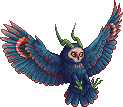Viewing SjJQj

Father: Unknown
Unknown Pedigree
Hardiness: 5
Appearance: 4
Emerged: 11:00 08.11.2022
Matured: 10:54 10.11.2022
Strigostos spend much of the year on long migrations in the far north but travel south to their nesting grounds during their short autumn mating season. Juveniles grow quickly and are capable of flight in time to join their parents on the long return journey north. Though their horns are decorative, their sharp talons and beak provide plenty of power for hunting and defense, and their thick-feathered wings allow for almost silent flight. Strigostos feed on any small prey they can catch, from Stranga Sciuros to young Fluganta Rato chicks. They show little preference when hunting, a behavior likely related to the necessary variations in their diet as they migrate, and males will offer their kill to their mate or offspring before eating themselves. Both adults and juveniles preen themselves regularly and will help each other groom any hard-to-reach spots. Keeping their feathers in perfect condition is important, as loose or ragged plumage can cause noise during flight. Due to their quiet nature, Strigostos are rarely sighted, but their low, haunting calls may be heard in the evening, heralding the start of their nightly hunt.
The creatures that dwell in this rather desolate world still display some diversity in appearance, eating habits, and social behavior. Whether they have fur or feathers, skin or scales, their unique genetic makeup allows for a variety of colors and markings within each species. Despite limitations in food sources, herbivores, omnivores, and carnivores are all present in the food chain, and each species requires specialized care within a laboratory. Although the artificial setting of housing units and breeding pods precludes most opportunities to study true interspecific behavior, the interactions within and between species has been studied extensively in the wilderness by scientists daring enough to venture beyond the outpost’s walls.
